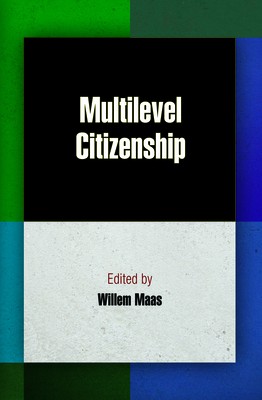
- We will send in 10–14 business days.
- Publisher: University of Pennsylvania Press
- ISBN-10: 0812245156
- ISBN-13: 9780812245158
- Format: 15.8 x 23.1 x 2.5 cm, hardcover
- Language: English
- SAVE -10% with code: EXTRA
Multilevel Citizenship (e-book) (used book) | bookbook.eu
Reviews
Description
Citizenship has come to mean legal and political equality within a sovereign nation-state; in international law, only states may determine who is and who is not a citizen. But such unitary status is the historical exception: before sovereign nation-states became the prevailing form of political organization, citizenship had a range of definitions and applications. Today, nonstate communities and jurisdictions both below and above the state level are once again becoming important sources of rights, allegiance, and status, thereby constituting renewed forms of multilevel citizenship. For example, while the European Union protects the nation-state's right to determine its own members, the project to construct a democratic polity beyond national borders challenges the sovereignty of member governments.
Multilevel Citizenship disputes the dominant narrative of citizenship as a homogeneous status that can be bestowed only by nation-states. The contributors examine past and present case studies that complicate the meaning and function of citizenship, including residual allegiance to empires, constitutional rights that are accessible to noncitizens, and the nonstate allegiance of nomadic nations. Their analyses consider the inconsistencies and exceptions of national citizenship as a political concept, such as overlapping jurisdictions and shared governance, as well as the emergent forms of sub- or supranational citizenships. Multilevel Citizenship captures the complexity of citizenship in practice, both at different levels and in different places and times. Contributors: Elizabeth F. Cohen, Elizabeth Dale, Will Hanley, Marc Helbling, Türküler Isiksel, Jenn Kinney, Sheryl Lightfoot, Willem Maas, Catherine Neveu, Luicy Pedroza, Eldar Sarajlic, Rogers M. Smith.EXTRA 10 % discount with code: EXTRA
The promotion ends in 16d.23:24:31
The discount code is valid when purchasing from 10 €. Discounts do not stack.
- Publisher: University of Pennsylvania Press
- ISBN-10: 0812245156
- ISBN-13: 9780812245158
- Format: 15.8 x 23.1 x 2.5 cm, hardcover
- Language: English English
Citizenship has come to mean legal and political equality within a sovereign nation-state; in international law, only states may determine who is and who is not a citizen. But such unitary status is the historical exception: before sovereign nation-states became the prevailing form of political organization, citizenship had a range of definitions and applications. Today, nonstate communities and jurisdictions both below and above the state level are once again becoming important sources of rights, allegiance, and status, thereby constituting renewed forms of multilevel citizenship. For example, while the European Union protects the nation-state's right to determine its own members, the project to construct a democratic polity beyond national borders challenges the sovereignty of member governments.
Multilevel Citizenship disputes the dominant narrative of citizenship as a homogeneous status that can be bestowed only by nation-states. The contributors examine past and present case studies that complicate the meaning and function of citizenship, including residual allegiance to empires, constitutional rights that are accessible to noncitizens, and the nonstate allegiance of nomadic nations. Their analyses consider the inconsistencies and exceptions of national citizenship as a political concept, such as overlapping jurisdictions and shared governance, as well as the emergent forms of sub- or supranational citizenships. Multilevel Citizenship captures the complexity of citizenship in practice, both at different levels and in different places and times. Contributors: Elizabeth F. Cohen, Elizabeth Dale, Will Hanley, Marc Helbling, Türküler Isiksel, Jenn Kinney, Sheryl Lightfoot, Willem Maas, Catherine Neveu, Luicy Pedroza, Eldar Sarajlic, Rogers M. Smith.

Reviews